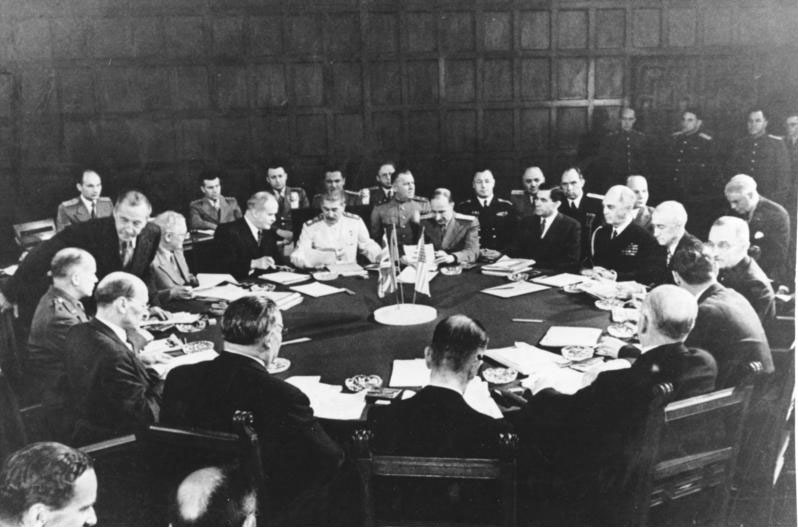 The Potsdam Conference was attended by the leaders of three nations including the United States, Great Britain, and the Soviet Union. This conference was held in Potsdam, Germany so these leaders could negotiate significant terms after the end of World War II. It lasted from July 17 until August 2, 1945, and it followed the Yalta Conference that took place in February, 1945.
The Potsdam Conference was attended by the leaders of three nations including the United States, Great Britain, and the Soviet Union. This conference was held in Potsdam, Germany so these leaders could negotiate significant terms after the end of World War II. It lasted from July 17 until August 2, 1945, and it followed the Yalta Conference that took place in February, 1945.
Highlights
When Churchill, Roosevelt, and Stalin met during the Yalta Conference, they agreed to discuss the postwar borders throughout Europe. After Germany’s defeat and surrender on May 8, 1945, the Allied leaders have decided to meet at Potsdam to settle the discussions at Yalta. While the Allies maintained their commitment to fight a joint war in Pacific regions, the absence of a common enemy led to challenges in attaining the consensus with regard to the postwar reconstruction throughout Europe.
 The main issue discussed at Potsdam was the concerns of how the Allies would handle Germany. During the Yalta Conference, the Soviet Union pressed for massive postwar reparations intended from Germany, and half of these were assigned to Soviet Union. Although Roosevelt acceded to these demands, Harry Truman was resolute to mitigate the case of Germany by obliging the occupying countries to precise reparations from their own occupation zones.
The main issue discussed at Potsdam was the concerns of how the Allies would handle Germany. During the Yalta Conference, the Soviet Union pressed for massive postwar reparations intended from Germany, and half of these were assigned to Soviet Union. Although Roosevelt acceded to these demands, Harry Truman was resolute to mitigate the case of Germany by obliging the occupying countries to precise reparations from their own occupation zones.
Byrnes and Truman encouraged such position because of the desire to prevent such situation from being repeated, which was believed to have been caused by the Versailles Treaty. With the huge reparation payments assigned to Germany after World War I, more problems were created and led to World War II. Numerous scholars agree that the massive reparations that handicapped the financial and economic status of Germany fueled the rise to power of the Nazis.
Agreements
The leaders of the Allied Powers managed to come to terms at the conference after numerous disagreements. For instance, they confirmed the status of the disarmed and demilitarized Germany under the four zones that were occupied by the Allied forces. Based on the protocol of the Potsdam Conference, there was a need for a total demilitarization and disarmament of Germany. Furthermore, all aspects of the German industry that may be used for military purposes must be dismantled. There was also a necessity to eliminate the military and paramilitary German forces. Moreover, Germany’s production of military hardware was greatly forbidden.
With all these conditions, the society of Germany was needed to be remade along the democratic lines by abolishing discriminatory laws that were created during the Nazi Era. In addition, all Germans that were responsible for massive damages and loss of lives were to be arrested and deemed as war criminals.
During the conference at Potsdam, it was also discussed that there was a need to purge the educational and judicial systems of Germany so it would be free of authoritarian influences. It was also necessary to encourage political parties in administering Germany at the state and local levels. However, the need to reconstitute the German government was postponed, and the Allied Control Commission would head the country for an indefinite period.
Controversies
A significant matter that was addressed at the conference was the revision of the Polish-Soviet-German borders, as well as the expulsion of millions of Germans from disputed territories. Following the changes in the Polish-Soviet border, Poland obtained a large portion of German territory, and it began to deport German residents that were in question. The same fate happened to Germans in various territories that were residing in other nations.
Although the negotiators at the conference were aware of this situation, they did not take any action. Instead, they declared that the transfers must be affected in a humane and orderly manner. Moreover, Hungarians, Poles, and Czechs suspended more deportations temporarily.
Aside from settling various matters related to Poland and Germany, the negotiators agreed on the formation of a special council that would receive authority on behalf of China, Soviet Union, Great Britain, and the United States. The Council would draft significant peace treaties with the former allies of Germany.
According to historians, the conference at Potsdam was rather memorable because of the conversation that took place between Truman and Stalin. The U.S. President’s firm stance and wisdom during the negotiations enhanced the country’s bargaining power with the Soviet Union. Nevertheless, the leaders of Great Britain, Soviet Union, and the United States failed to meet again collectively to talk about issues regarding cooperation during the postwar reconstruction.